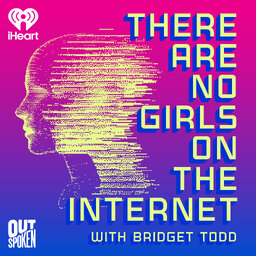What we’re leaving behind in the new year - STUFF MOM NEVER TOLD YOU
It’s a new year, which is a great opportunity to take stock of what we’re leaving behind in tech in the new year.
Bridget joined Sam and Anney over at Stuff Mom Never Told You to get into what’s not coming with us in 2024.
In 1 playlist(s)
There Are No Girls on the Internet
Marginalized voices have always been at the forefront of the internet, yet our stories often go over…Social links
Follow podcast
Recent clips

Chris Pratt Is Hawking an Anti-Abortion Prayer App; Elon's Grok Is Doxxing Women; DOGE Bros Let ChatGPT Do Their Job; Trump’s Big DEI Loss – NEWS ROUNDUP
1:07:04

Satanic Panic of the 1980s Is Happening Again — This Time in Minnesota Daycares (w/ Sarah Marshall)
51:40

Amazon Ring Super Bowl Ad BACKFIRES; YouTubers Exploit Women's Arrest Videos; Salesforce CEO ICE "Joke" – NEWS ROUNDUP!
1:10:54
 There Are No Girls on the Internet
There Are No Girls on the Internet